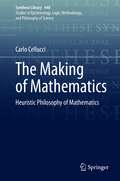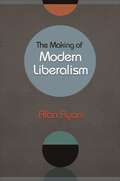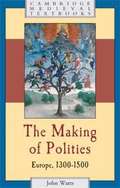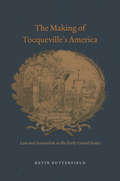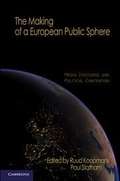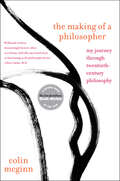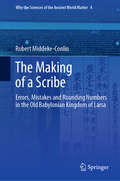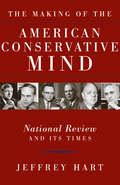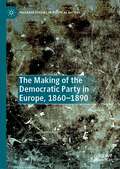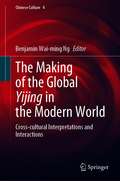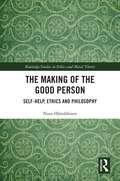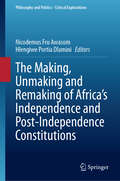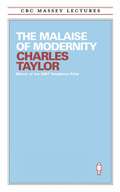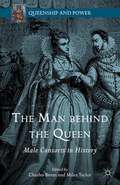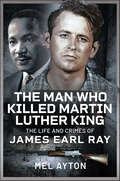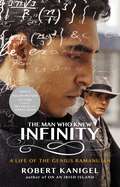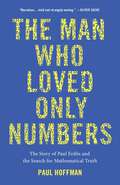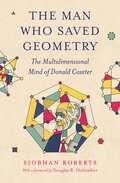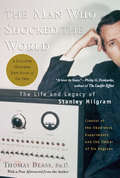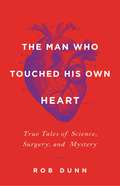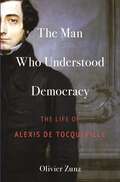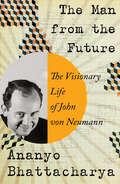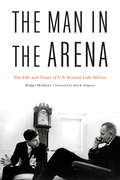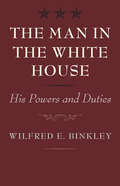- Table View
- List View
The Making of Mathematics: Heuristic Philosophy of Mathematics (Synthese Library #448)
by Carlo CellucciThis book offers an alternative to current philosophy of mathematics: heuristic philosophy of mathematics. In accordance with the heuristic approach, the philosophy of mathematics must concern itself with the making of mathematics and in particular with mathematical discovery. In the past century, mainstream philosophy of mathematics has claimed that the philosophy of mathematics cannot concern itself with the making of mathematics but only with finished mathematics, namely mathematics as presented in published works. On this basis, mainstream philosophy of mathematics has maintained that mathematics is theorem proving by the axiomatic method. This view has turned out to be untenable because of Gödel’s incompleteness theorems, which have shown that the view that mathematics is theorem proving by the axiomatic method does not account for a large number of basic features of mathematics. By using the heuristic approach, this book argues that mathematics is not theorem proving by the axiomatic method, but is rather problem solving by the analytic method. The author argues that this view can account for the main items of the mathematical process, those being: mathematical objects, demonstrations, definitions, diagrams, notations, explanations, applicability, beauty, and the role of mathematical knowledge.
The Making of Modern Liberalism
by Alan RyanOne of the world's leading political thinkers explores the history, nature, and prospects of the liberal traditionThe Making of Modern Liberalism is a deep and wide-ranging exploration of the origins and nature of liberalism from the Enlightenment through its triumphs and setbacks in the twentieth century and beyond. The book is the fruit of the more than four decades during which Alan Ryan, one of the world's leading political thinkers, reflected on the past of the liberal tradition—and worried about its future.This is essential reading for anyone interested in political theory or the history of liberalism.
The Making of Polities: Europe, 1300-1500
by John WattsThis major survey of political life in late medieval Europe - the first for more than thirty years - provides an entirely new framework for understanding the developments that shaped this turbulent period. Rather than emphasising crisis, decline, disorder or the birth of the modern state, this account centres on the mixed results of political and governmental growth across the continent. The age of the Hundred Years War, schism and revolt was also a time of rapid growth in jurisdiction, taxation and representation, of spreading literacy and evolving political technique. This mixture of state formation and political convulsion lay at the heart of the 'making of polities'. Offering a full introduction to political events and processes from the fourteenth century to the sixteenth, this book combines a broad, comparative account with discussion of individual regions and states, including eastern and northern Europe alongside the more familiar west and south.
The Making of Tocqueville's America: Law and Association in the Early United States (American Beginnings, 1500-1900 Ser.)
by Kevin ButterfieldAlexis de Tocqueville was among the first to draw attention to Americans’ propensity to form voluntary associations—and to join them with a fervor and frequency unmatched anywhere in the world. For nearly two centuries, we have sought to understand how and why early nineteenth-century Americans were, in Tocqueville’s words, “forever forming associations.” In The Making of Tocqueville’s America, Kevin Butterfield argues that to understand this, we need to first ask: what did membership really mean to the growing number of affiliated Americans? Butterfield explains that the first generations of American citizens found in the concept of membership—in churches, fraternities, reform societies, labor unions, and private business corporations—a mechanism to balance the tension between collective action and personal autonomy, something they accomplished by emphasizing law and procedural fairness. As this post-Revolutionary procedural culture developed, so too did the legal substructure of American civil society. Tocqueville, then, was wrong to see associations as the training ground for democracy, where people learned to honor one another’s voices and perspectives. Rather, they were the training ground for something no less valuable to the success of the American democratic experiment: increasingly formal and legalistic relations among people.
The Making of a European Public Sphere
by Ruud Koopmans Paul StathamThis book investigates an important source of the European Union's recent legitimacy problems. It shows how European integration is debated in mass media, and how this affects democratic inclusiveness. Advancing integration implies a shift in power between governments, parliaments, and civil society. Behind debates over Europe's "democratic deficit" is a deeper concern: whether democratic politics can perform effectively under conditions of Europeanization and globalization. This study is based on a wealth of unique data from seven European countries, combining newspaper content analyses, an innovative study of Internet communication structures, and hundreds of interviews with leading political and media representatives across Europe. It is by far the most far-reaching and empirically grounded study on the Europeanization of media discourse and political contention to date, and a must-read for anyone interested in how European integration changes democratic politics and why European integration has become increasingly contested.
The Making of a Philosopher: My Journey Through Twentieth-Century Philosophy
by Colin McGinnPart memoir, part study, The Making of a Philosopher is the self–portrait of a deeply intelligent mind as it develops over a life on both sides of the Atlantic.The Making of a Philosopher follows Colin McGinn from his early years in England reading Descartes and Anselm, to his years in the states, first in Los Angeles, then New York. McGinn presents a contemporary academic take on the great philosophical figures of the twentieth century, including Bertrand Russell, Jean–Paul Sartre, and Noam Chomsky, alongside stories of the teachers who informed his ideas and often became friends and mentors, especially the colorful A.J. Ayer at Oxford. McGinn's prose is always elegant and probing; students of contemporary philosophy and the general reader alike will absorb every page.
The Making of a Scribe: Errors, Mistakes and Rounding Numbers in the Old Babylonian Kingdom of Larsa (Why the Sciences of the Ancient World Matter #4)
by Robert Middeke-ConlinThis book presents a novel methodology to study economic texts. The author investigates discrepancies in these writings by focusing on errors, mistakes, and rounding numbers. In particular, he looks at the acquisition, use, and development of practical mathematics in an ancient society: The Old Babylonian kingdom of Larsa (beginning of the second millennium BCE Southern Iraq). In so doing, coverage bridges a gap between the sciences and humanities. Through this work, the reader will gain insight into discrepancies encountered in economic texts in general and rounding numbers in particular. They will learn a new framework to explain error as a form of economic practice. Researchers and students will also become aware of the numerical and metrological basis for calculation in these writings and how the scribes themselves conceptualized value. This work fills a void in Assyriological studies. It provides a methodology to explore, understand, and exploit statistical data. The anlaysis also fills a void in the history of mathematics by presenting historians of mathematics a method to study practical texts. In addition, the author shows the importance mathematics has as a tool for ancient practitioners to cope with complex economic processes. This serves as a useful case study for modern policy makers into the importance of education in any economy.
The Making of the American Conservative Mind: National Review and Its Times
by Jeffrey HartNational Review has been the leading conservative national magazine since it was founded in 1955, and in that capacity it has played a decisive role in shaping the conservative movement in the United States. In The Making of the American Conservative Mind, Jeffrey Hart provides an authoritative and high-spirited history of how the magazine has come to define and defend conservatism for the past fifty years. He also gives a firsthand account of the thought and sometimes colorful personalities—including James Burnham, Willmoore Kendall, Russell Kirk, Frank Meyer, William Rusher, Priscilla Buckley, Gerhart Niemeyer, and, of course, the magazine&’s founder, William F. Buckley Jr.—who contributed to National Review&’s life and wide influence.As Hart sees it, National Review has regularly veered toward ideology, but it has also regularly corrected its course toward, in Buckley&’s phrase, a &“politics of reality.&” Its catholicity and originality—attributable to Buckley&’s magnanimity and sense of showmanship—has made the magazine the most interesting of its kind in the nation, concludes Hart. His highly readable and occasionally contrarian history, the first history of National Review yet published, marks another milestone in our understanding of how the conservatism now so influential in American political life draws from, and in some ways repudiates, the intellectual project that National Review helped launch a half century ago.
The Making of the Democratic Party in Europe, 1860–1890 (Palgrave Studies in Political History)
by Anne HeyerThis book analyses the emergence of modern parties in nineteenth-century Europe and explores their connection with the slowly developing institution of democracy. The close relationship between party and democracy was established by the founders of the first modern parties who presented themselves as representatives of the people. Focusing on the ideas and practices of party founders, this book moves away from the traditional view that party formation was the result of industrialisation. It instead shows that the response of party founders was to frame and establish the modern party as an alternative to existing models of political representation, and one that was characterised by popular participation.In order to mobilize their followers, party founders gave new meaning to existing structures and developed new practices of political organization. The result was the creation of organizations that continue to shape the history of modern democracy.Exploring the foundation of three political parties: the German Social Democratic Workers’ Party (SDAP); the Dutch Anti-Revolutionary Party (ARP); and the British National Liberal Federation, the author analyses the phenomenon of innovative party formation in nineteenth-century Europe, before the democratic mass-membership party had become a widely accepted concept. Taking a transnational and comparative approach, this book illustrates the decisive role of party founders in the formation of modern democracy, making it an essential read for anyone researching the history of democracy and political parties.
The Making of the Global Yijing in the Modern World: Cross-cultural Interpretations and Interactions (Chinese Culture #4)
by Benjamin Wai-ming NgThis book represents an ambitious effort to bring leading Yijing scholars together to examine the globalisation and localisation of the 'Book of Changes' from cross-cultural and comparative perspectives. It focuses on how the Yijing has been used to support ideologies, converted into knowledge, and assimilated into global cultures in the modern period, transported from the Sinosphere to British, American and French cultural traditions, travelling from East Asia to Europe and the United States. The book provides conceptualised narratives and cross-cultural analyses of the global popularisation and local assimilation of the Yijing, highlighting the transformation and application of the Yijing in different cultural traditions, and demonstrating how it acquired different meanings and took on different roles in the context of a global setting. In presenting a novel contribution to understandings of the multifaceted nature of the Yijing, this book is essential reading for scholars and students interested in the 'Classic of Changes'. It is also a useful reference for those studying Chinese culture, Asian philosophy, East Asian studies, and translation studies.
The Making of the Good Person: Self-Help, Ethics and Philosophy (Routledge Studies in Ethics and Moral Theory)
by Nora HämäläinenThis book provides a philosophical assessment of the idea of personhood advanced in popular self-help literature. It also traces, within academic philosophy and philosophical scholarship, a self-help culture where the self is brought forth as an object of improvement and a key to meaning, progress, and profundity. Unlike other academic treatments of the topic of self-help, this book is not primarily concerned with providing a critique of popular self-help and self-transformative practices. Rather, it is concerned with how they work to shape contemporary forms and ideals of moral personhood and are conducive to moral renegotiation and change. The book consists of two parts with somewhat different argumentative strategies. Part 1 consists of an overview and reassessment of popular self-help literature and its sociological and journalistic critics, written from a moral philosophical perspective. Part 2 opens with discussion of the current attraction, among a range of philosophers, to self-transformative themes. The chapters assess the strand of self-transformative philosophy found in the work of Ludwig Wittgenstein, Michel Foucault, Pierre Hadot, Stanley Cavell, and Iris Murdoch. Finally, the book concludes with a discussion of the theme of social change and moral renegotiation in contemporary societies, which is a central but underestimated undercurrent in discussions on contemporary self-transformative practices. The book’s dual perspective—on both popular self-help and self-transformative currents in philosophy—enables a cultural and moral philosophical analysis of contemporary ethical ideals of personhood, as well as reflection on the literatures available for its development. The Making of the Good Person will be of interest to scholars and advanced students working in moral philosophy, history of philosophy, psychology, sociology, and literary studies.
The Making, Unmaking and Remaking of Africa’s Independence and Post-Independence Constitutions (Philosophy and Politics - Critical Explorations #31)
by Hlengiwe Portia Dlamini Nicodemus Fru AwasomThis book provides a collection of chapters that critically explore the making and development of Africa’s independence constitutions through the different phases in their full generality. Since independence, various constitutions from African countries have undergone a succession of changes, triggered by either the domestic or international environment or both. These processes constitute autonomous epochal ‘waves’ or ‘phases’ of constitution-making which need to be unpacked, historicised and explored in a systematic manner. This work, intended as a distinctive object of positive analysis, historicizes the independence constitutions of selected African states on either a country-specific or a comparative basis. A historical approach to the continental study of constitutions is rare, meaning the continental coverage of the book is justified by Africa’s rich diversity reflected in its multiple monarchical and colonial backgrounds. The book is of interest to academics interested in having a panoramic view of Africa's constitutional development from a historical perspective.
The Malaise of Modernity (The CBC Massey Lectures)
by Charles TaylorIn Malaise of Modernity, Charles Taylor focuses on the key modern concept of self-fulfillment, often attacked as the central support of what Christopher Lasch has called the culture of narcissism. To Taylor, self-fulfillment, although often expressed in self-centered ways, isn't necessarily a rejection of traditional values and social commitment; it also reflects something authentic and valuable in modern culture. Only by distinguishing what is good in this modern striving from what is socially and politically dangerous, Taylor says, can our age be made to deliver its promise.
The Man Behind The Queen
by Charles Beem Miles TaylorFrom the 14th-century king consorts of Navarre to the modern European prince consorts of the 20th century, the male consort has been a peculiar yet recurrent historical figure. In this impressively broad collection, leading historians of monarchy analyze how male partners of female rulers have negotiated their unique roles throughout history.
The Man Who Killed Martin Luther King: The Life and Crimes of James Earl Ray
by Mel AytonDoubts about James Earl Ray, Dr. Martin Luther King’s lone assassin, arose almost immediately after the civil rights leader was fatally shot on the balcony of the Lorraine Motel in Memphis on 4 April 1968. From the start, his aides voiced suspicions that a conspiracy was responsible for their leader’s death. Over time many Americans became convinced the government investigations covered up the truth about the alleged assassin. Exactly what led Ray to kill King continues to be a source of debate, as does his role in the murder. However, Mel Ayton believe the answers to the many intriguing questions about Ray and how conspiracy ideas flourished can now be fully understood. Missing from the wild speculations over the past fifty-two years has been a thorough investigation of the character of King’s assassin. Additionally, the author examines exactly how the conspiracy notions came about and the falsehoods that led to their promulgation. The Man Who Killed Martin Luther King is the first full account of the life of James Earl Ray based on scores of interviews provided to government and non-government investigators and from the FBI’s and Scotland Yard’s files plus the recently released Tennessee Department of Corrections prison record on Ray. Most importantly, the testimony of Anna Sandhu has often been ignored by writers but her story is crucial in gaining an understanding of Ray’s deceptive ways. A courtroom artist, who, after listening to Ray’s story, later married him. Also missing from accounts of the alleged ‘conspiracy’ is the story told to this author by Brushy Mountain State Penitentiary Deputy Warden Rolland H. Cisson, which decisively renders Ray’s claims of innocence to be bogus. In the short-lived freedom he acquired after escaping from the Missouri State Penitentiary in 1967, following being sentenced to twenty years in prison for repeated offenses, he traveled to Los Angeles and decided to seek notoriety as the one who would stalk and kill Dr. King, who he had come to hate vehemently. From the time of King’s murder, the reader will follow Ray to solitary confinement in a Nashville prison. Then, six years later, on 10 June 1977, James Earl Ray again escaped from prison, this time with five others. Ray was the last to be recaptured, having survived only on wheatgerm. Finally, the book relays Ray’s stabbing by several black inmates, then his resulting diagnosis with Hepatitis C, which caused his death twelve years later, in 1998.
The Man Who Knew Infinity: A Life of the Genius Ramanujan
by Robert KanigelNOW A MAJOR MOTION PICTURE STARRING JEREMY IRONS AND DEV PATEL! A moving and enlightening look at the unbelievable true story of how gifted prodigy Ramanujan stunned the scholars of Cambridge University and revolutionized mathematics.In 1913, a young unschooled Indian clerk wrote a letter to G H Hardy, begging the preeminent English mathematician's opinion on several ideas he had about numbers. Realizing the letter was the work of a genius, Hardy arranged for Srinivasa Ramanujan to come to England. Thus began one of the most improbable and productive collaborations ever chronicled. With a passion for rich and evocative detail, Robert Kanigel takes us from the temples and slums of Madras to the courts and chapels of Cambridge University, where the devout Hindu Ramanujan, "the Prince of Intuition," tested his brilliant theories alongside the sophisticated and eccentric Hardy, "the Apostle of Proof." In time, Ramanujan's creative intensity took its toll: he died at the age of thirty-two, but left behind a magical and inspired legacy that is still being plumbed for its secrets today.
The Man Who Loved Only Numbers: The Story of Paul Erdos and the Search for Mathematical Truth
by Paul Hoffman"A funny, marvelously readable portrait of one of the most brilliant and eccentric men in history." --The Seattle Times Paul Erdos was an amazing and prolific mathematician whose life as a world-wandering numerical nomad was legendary. He published almost 1500 scholarly papers before his death in 1996, and he probably thought more about math problems than anyone in history. Like a traveling salesman offering his thoughts as wares, Erdos would show up on the doorstep of one mathematician or another and announce, "My brain is open." After working through a problem, he'd move on to the next place, the next solution. Hoffman's book, like Sylvia Nasar's biography of John Nash, A Beautiful Mind, reveals a genius's life that transcended the merely quirky. But Erdos's brand of madness was joyful, unlike Nash's despairing schizophrenia. Erdos never tried to dilute his obsessive passion for numbers with ordinary emotional interactions, thus avoiding hurting the people around him, as Nash did. Oliver Sacks writes of Erdos: "A mathematical genius of the first order, Paul Erdos was totally obsessed with his subject--he thought and wrote mathematics for nineteen hours a day until the day he died. He traveled constantly, living out of a plastic bag, and had no interest in food, sex, companionship, art--all that is usually indispensable to a human life."The Man Who Loved Only Numbers is easy to love, despite his strangeness. It's hard not to have affection for someone who referred to children as "epsilons," from the Greek letter used to represent small quantities in mathematics; a man whose epitaph for himself read, "Finally I am becoming stupider no more"; and whose only really necessary tool to do his work was a quiet and open mind. Hoffman, who followed and spoke with Erdos over the last 10 years of his life, introduces us to an undeniably odd, yet pure and joyful, man who loved numbers more than he loved God--whom he referred to as SF, for Supreme Fascist. He was often misunderstood, and he certainly annoyed people sometimes, but Paul Erdos is no doubt missed. --Therese Littleton
The Man Who Saved Geometry: The Multidimensional Mind of Donald Coxeter
by Siobhan RobertsAn illuminating biography of one of the greatest geometers of the twentieth centuryDriven by a profound love of shapes and symmetries, Donald Coxeter (1907–2003) preserved the tradition of classical geometry when it was under attack by influential mathematicians who promoted a more algebraic and austere approach. His essential contributions include the famed Coxeter groups and Coxeter diagrams, tools developed through his deep understanding of mathematical symmetry. The Man Who Saved Geometry tells the story of Coxeter&’s life and work, placing him alongside history&’s greatest geometers, from Pythagoras and Plato to Archimedes and Euclid—and it reveals how Coxeter&’s boundless creativity reflects the adventurous, ever-evolving nature of geometry itself. With an incisive, touching foreword by Douglas R. Hofstadter, The Man Who Saved Geometry is an unforgettable portrait of a visionary mathematician.
The Man Who Shocked The World: The Life and Legacy of Stanley Milgram
by Thomas BlassCreator of the famous Obedience Experiments and originator of the ?six degrees of separationOCO theory, Stanley Milgram transformed our understanding of human nature and continues to be one of the most important figures in psychology and beyond. In this sparkling biography, Thomas Blass captures the colorful personality and pioneering work of a visionary scientist who revealed the hidden workings of our social world. In this new paperback edition, he includes an afterword connecting MilgramOCOs theories to torture, war crimes, and Abu Ghraib. "
The Man Who Touched His Own Heart: True Tales of Science, Surgery, and Mystery
by Rob DunnThe secret history of our most vital organ--the human heartThe Man Who Touched His Own Heart tells the raucous, gory, mesmerizing story of the heart, from the first "explorers" who dug up cadavers and plumbed their hearts' chambers, through the first heart surgeries-which had to be completed in three minutes before death arrived-to heart transplants and the latest medical efforts to prolong our hearts' lives, almost defying nature in the process.Thought of as the seat of our soul, then as a mysteriously animated object, the heart is still more a mystery than it is understood. Why do most animals only get one billion beats? (And how did modern humans get to over two billion-effectively letting us live out two lives?) Why are sufferers of gingivitis more likely to have heart attacks? Why do we often undergo expensive procedures when cheaper ones are just as effective? What do Da Vinci, Mary Shelley, and contemporary Egyptian archaeologists have in common? And what does it really feel like to touch your own heart, or to have someone else's beating inside your chest? Rob Dunn's fascinating history of our hearts brings us deep inside the science, history, and stories of the four chambers we depend on most.
The Man Who Understood Democracy: The Life of Alexis de Tocqueville
by Olivier ZunzA definitive biography of the French aristocrat who became one of democracy’s greatest championsIn 1831, at the age of twenty-five, Alexis de Tocqueville made his fateful journey to America, where he observed the thrilling reality of a functioning democracy. From that moment onward, the French aristocrat would dedicate his life as a writer and politician to ending despotism in his country and bringing it into a new age. In this authoritative and groundbreaking biography, leading Tocqueville expert Olivier Zunz tells the story of a radical thinker who, uniquely charged by the events of his time, both in America and France, used the world as a laboratory for his political ideas.Placing Tocqueville’s dedication to achieving a new kind of democracy at the center of his life and work, Zunz traces Tocqueville’s evolution into a passionate student and practitioner of liberal politics across a trove of correspondence with intellectuals, politicians, constituents, family members, and friends. While taking seriously Tocqueville’s attempts to apply the lessons of Democracy in America to French politics, Zunz shows that the United States, and not only France, remained central to Tocqueville’s thought and actions throughout his life. In his final years, with France gripped by an authoritarian regime and America divided by slavery, Tocqueville feared that the democratic experiment might be failing. Yet his passion for democracy never weakened.Giving equal attention to the French and American sources of Tocqueville’s unique blend of political philosophy and political action, The Man Who Understood Democracy offers the richest, most nuanced portrait yet of a man who, born between the worlds of aristocracy and democracy, fought tirelessly for the only system that he believed could provide both liberty and equality.
The Man from the Future: The Visionary Life of John von Neumann
by Ananyo BhattacharyaAn electrifying biography of one of the most extraordinary scientists of the twentieth century and the world he made. The smartphones in our pockets and computers like brains. The vagaries of game theory and evolutionary biology. Nuclear weapons and self-replicating spacecrafts. All bear the fingerprints of one remarkable, yet largely overlooked, man: John von Neumann. Born in Budapest at the turn of the century, von Neumann is one of the most influential scientists to have ever lived. A child prodigy, he mastered calculus by the age of eight, and in high school made lasting contributions to mathematics. In Germany, where he helped lay the foundations of quantum mechanics, and later at Princeton, von Neumann’s colleagues believed he had the fastest brain on the planet—bar none. He was instrumental in the Manhattan Project and the design of the atom bomb; he helped formulate the bedrock of Cold War geopolitics and modern economic theory; he created the first ever programmable digital computer; he prophesized the potential of nanotechnology; and, from his deathbed, he expounded on the limits of brains and computers—and how they might be overcome. Taking us on an astonishing journey, Ananyo Bhattacharya explores how a combination of genius and unique historical circumstance allowed a single man to sweep through a stunningly diverse array of fields, sparking revolutions wherever he went. The Man from the Future is an insightful and thrilling intellectual biography of the visionary thinker who shaped our century.
The Man in the Arena: The Life and Times of U.S. Senator Gale McGee
by Alan K. Simpson Rodger McDanielThere was a time when Wyoming and other Rocky Mountain and midwestern states were as likely to elect a liberal Democrat to Congress as they were a conservative Republican. Gale McGee (1915–92) was elected to the U.S. Senate in 1958, at the height of American liberalism. He typified what Teddy Roosevelt called “the man in the arena” and was a major player in the development of America’s post–World War II foreign policy and almost every legislative milestone in U.S. history from the 1950s to 1980. McGee’s careers as an academic, a senator, and an ambassador spanned World War II, the Red Scare, the Korean and Vietnam Wars, and the activist Congress of the 1960s. This elegantly conceived biography of a liberal from the conservative rural state of Wyoming offers readers a glimpse into formative political shifts of the twentieth century. The national liberal consensus of the 1960s, in which McGee played a major role, gave the nation Social Security, Medicare, Medicaid, the minimum wage, and the right to collective bargaining, as well as landmark civil rights and environmental reforms. That consensus had ended by the mid-1970s as McGee’s liberalism would no longer be welcome to represent the Equality State. Moving beyond biography, Rodger McDaniel addresses the significant shift in government and details how the attribution “liberal” became a candidate’s epitaph, as widespread distrust of government cast a shadow on the many benefits acquired through the old liberal consensus. McDaniel’s insights into the past as well as McGee’s experiences in the arena shed unexpected light on the present state of U.S. politics and government.
The Man in the White House: His Powers and Duties
by Wilfred E. Binkley“Mr. Binkley’s interpretations . . . of the Presidency have deservedly been of great influence; and the reasons are evident to the reader of this book.” —The Journal of PoliticsThe Constitution of the United States says little about the president’s specific duties other than the enforcement of the laws of the land. Combining brilliant scholarship with a lively style, this book reveals how deep-seated forces, inherent in American society and affecting the presidency for over two centuries, have transformed the office created by the framers of the Constitution into the complex, powerful, and responsible institution it is today.The administrations of the “strong” presidents have added to the powers and duties of the office as we know them. In addition, such social and political forces as the growth of political parties, economic and geographic expansion, and the changing nature of the national government have all had their influence on the presidency. These processes are historically traced by the author and illustrated by vivid examples of how they worked in the case of such holders of the office as Washington, Jackson, Polk, Lincoln, the two Roosevelts, and Eisenhower.Every chapter of the book brings a fresh and authoritative approach to an office and an institution that is the subject of searching debates today.“Into it he has put all the insight and charm and sense of proportion that have marked each of his remarkable books on American institutions . . . The importance of the presidency in molding our politics and of politics as a weapon of the successful President have never been stated more clearly and conclusively than in these chapters.” —The American Historical Review
